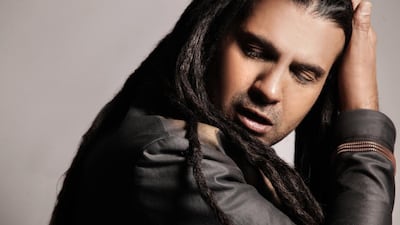After a lengthy career in which he topped British and Indian music charts, the reggae artist Apache Indian's groovy track Boom Shack-a-Lak can still get crowds on the dance floor. The 47-year-old British vocalist of Indian origin – he is Steven Kapur offstage – completes 25 years in the music industry this year with seven Top 40 UK hits to his credit and selling more than 11 million albums worldwide.
Kapur shows no signs of slowing down, with his recent album It Is What It Is striking a chord with the younger generation. The artist, whose bhangragga tunes (bhangra and dancehall) were all the rage in the 1990s, will be performing live in Dubai on Friday for Indian Independence Day. Apache tells us how he wants to reverse the diminishing appeal of reggae and his intention of bringing the Apache Indian Music Academy to the UAE.
Why did you decide to promote your new album in the UAE?
Dubai has always been one of my favourite destinations. This year, I’m trying to go to all my favourite places because I am celebrating 25 years in the business.
What changes have you seen in the industry?
My years in the industry have been great. I’ve been around the world seven times and I’ve never stopped touring. My music has appealed to all kinds of reggae, world-music and Asian-music fans. I think the biggest change in the industry has been the internet – it’s great because the world is our market now.
Can you tell us about the new album It Is What It Is?
The new album was recorded in America with the producer Jim Bean. He has worked with Britney Spears, Timbaland and Nelly Furtado. Some people have said this is my best album to date, so I am very proud of it. It has a different kind of feel, but still has Hindi, Punjabi and lots of reggae – all the things I’m known for and love.
What are your expansion plans with the Apache Indian Music (AIM) Academy?
I’ve always wanted to work with the community and the academy is in the Handsworth campus of the South and City College in Birmingham, UK, which has 22,000 students. I’m sharing my experience of music and we impart life skills there, which has shown massive results in the past six months. It is free for young people. We want to open up such academies around the world and are talking to people in India and New York. I’m also speaking to sponsors in the UAE because this is an initiative that breaks barriers in the community.
How do you intend to raise the profile of reggae music to the popularity it once had?
There was a lot of reggae that was played in the 1990s, with Shaggy, Sean Paul and myself. Over the years I’ve not seen much of that and that could be because young people are enjoying different styles of music. The stations have changed because the music business has changed. They are playing a lot of pop music – record companies control the stations and are playing it safe. So this kind of music has taken a dip and gone back underground. We are trying to get reggae back onto the mainstream stations.
What can the audience look forward to on Friday?
I am going to sing all my big hits – Chok There, Boom Shack-a-Lak and songs from my new album. It is going to be a great uptempo show for the entire family. I hope my music finds new young fans, too.
Apache Indian is at The Music Room in Dubai tomorrow. Tickets for the show cost Dh70. Visit www.themusicroomdubai.com
aahmed@thenational.ae

